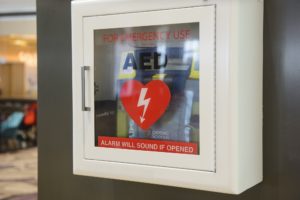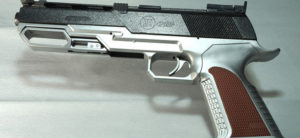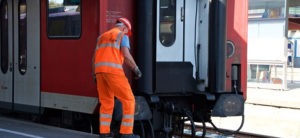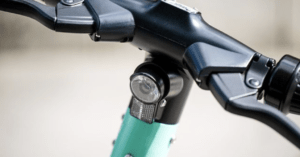AED Liability in Las Vegas Personal Injury Cases

Over the years, there has been an increased emphasis to keep life-saving devices in high-traffic buildings. Fire extinguishers were the standard for decades, but as heart conditions have become increasingly more prevalent, more and more states have adopted laws to include defibrillators on-site as well.
Automated External Defibrillators (AEDs) are portable, compact devices that are designed to restart a victim’s heart with an electric shock, should he or she go into sudden cardiac arrest. They are intended to be used by both medical personnel as well as non-medical employees who have completed proper training. According to the American Heart Association, 90 percent of heart attack victims who receive a shock from an AED within the first few minutes will survive.
Based on these numbers, it’s not hard to see the immense benefits of keeping an AED on-site, as well as the potential dangers of not having one handy.
AED Legislation
At the national level, AEDs are required to be kept and maintained at all federal buildings, including but not limited to:
- Courthouses
- Post offices
- DMVs
- Airports
For a free legal consultation, call (725) 900-9000
As is typical with most legislation, the different states vary dramatically in AED regulations. In the state of Nevada, the onus of keeping an AED is concurrent with federal mandates, but also extends to the following:
- Any county within the state that has a population of 100,000 or more residents is required to keep an AED at every high school in that county’s school district.
- Reno-Tahoe and McCarran International Airports are both required to keep at least three (3) AEDs in prominent locations throughout both properties.
- Various state and county buildings, including the Capitol Building in Carson City, the Legislative Building in Carson City, and the Grant Sawyer Building in Las Vegas.
- All sporting arenas and convention centers
Other places that may keep an AED on-site but are not necessarily explicitly required to include nursing homes, theme parks, and golf courses.
Injury Liability
The consequences of not having an AED on-site when a victim is experiencing heart failure can be fatal. Aside from death, other side effects of delayed cardiac intervention can include permanent sensory loss (vision, hearing, smell, etc.), stroke, and irreversible brain damage.
Click to contact our personal injury lawyers today
If an individual experiences heart failure or goes into cardiac arrest while on a property that is required to keep an AED handy, but that AED is either defective or nonexistent, he or she may be entitled to a personal injury, wrongful death, or premises liability claim.
Complete a Free Case Evaluation form now
Any case involving AED liability will involve similar elements: a duty of care, the company’s breach of that duty, causation of injuries, and damages. For premises liability claims, defendants must focus on the fact that the person(s) responsible for maintaining the property either neglected unsafe conditions or failed to properly warn consumers.
Hypothetical Example
Here’s a hypothetical scenario: let’s say our plaintiff Joe is standing in the concession line at T-Mobile Arena during a Golden Knights game, when suddenly he goes into cardiac arrest. Both Joe and surrounding bystanders make an effort to alert staff and officials, and yet no one arrives with an AED and Joe is left to fend for himself for minutes on end until paramedics arrive on scene. Joe survives, but because of the delay in treatment he is left with permanent brain damage.
In this scenario, Joe is eligible to sue the arena owners because: (1) they owed him a duty of care to keep an AED on-site; (2) they breached this duty by not employing the use of an AED to Joe, who clearly needed assistance; (3) this denial of treatment directly led to Joe being permanently disabled– now, one might argue that there is no guarantee that he would have survived even with an AED, however it is a guarantee that he would not have suffered brain damage had he been treated sooner; (4) finally, as a result of these injuries, Joe is entitled to recoup damages, because of medical costs and an inability to work.
Contact Us
If you or a loved one has had a similar experience of AED injury liability, be sure to consult with a medical professional to address any immediate concerns. Next, contact the knowledgeable staff of Las Vegas AED liability lawyers at Van Law Firm.
Call our Las Vegas office today at (725) 900-9000 for a free consultation regarding your case. Our experienced personal injury and wrongful death attorneys can recover multiple forms of compensation, from medical reimbursement, to lost wages and pain and suffering. Don’t hesitate– get started with your case today.
No obligation consultations are always free.
Let Us Help You! Call Now: (725) 900-9000


